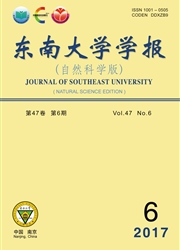

 中文摘要:
中文摘要:
A novel image restoration model coupling with a gradient fidelity term based on adaptive total variation is proposed in this paper. In order to choose proper parameters, the selection criteria were analyzed theoretically, and a simple scheme to demonstrate its validity was adopted experimentally. To make fair comparisons of performances of three models, the same numerical algorithm was used to solve partial differential equations. Both the international standard test image on Lena and HR image of CBERS-02B of Dalian city were used to verify the performance of the model. Experimental results illustrate that the new model not only preserved the edge and important details but also alleviated the staircase effect effectively.
 英文摘要:
英文摘要:
A novel image restoration model coupling with a gradient fidelity term based on adaptive total variation is proposed in this paper. In order to choose proper parameters, the selection criteria were analyzed theoretically, and a simple scheme to demonstrate its validity was adopted experimentally. To make fair comparisons of performances of three models, the same numerical algorithm was used to solve partial differential equations. Both the international standard test image on Lena and HR image of CBERS-02B of Dalian city were used to verify the performance of the model. Experimental results illustrate that the new model not only preserved the edge and important details but also alleviated the staircase effect effectively.
 同期刊论文项目
同期刊论文项目
 同项目期刊论文
同项目期刊论文
 期刊信息
期刊信息
